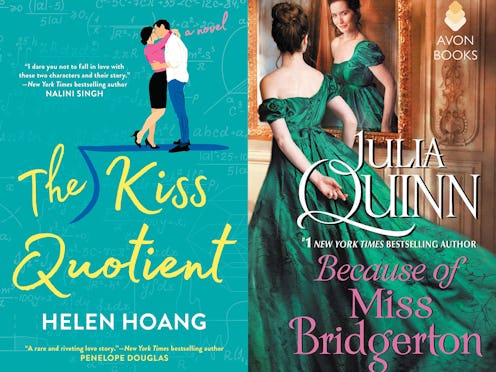Books
Romance Novels Might Be Some Of The Most Rebellious Books You Can Read Right Now

Though our reading interests and tastes often differ, often significantly, my mother and I have actively read books, talked about books, swapped books back-and-forth, and gone on book browsing missions together for as long as I can remember. Recently, however, our conversation took a turn it typically doesn’t — we began discussing those books. You know, the sexy ones.
“I know they’re not the most intelligent reading,” my mother said, in a tone that could only be described as apologetic, referring to her love of writers like Nora Roberts and Julia Quinn as a “guilty pleasure.”
“Of course you’ve been taught to feel guilty about reading romance novels,” I told her. “They’re practically the only books in which women get exactly what they want, all of the time, and aren’t asked to feel bad about it.”
Certainly, this isn’t always true — women have been subjugated in the pages of romance novels just as frequently as we have been in other novels, and just as frequently as we have been in real life. But the idea that romance novels might be considered feminist reading — and, more specifically, might respond to the recent revival of the #MeToo Movement — is one being bandied about book clubs and the internet these days.
Plus, this idea — the romance novel as “guilty pleasure” — does seem like just one more way to disparage, dismiss, and discount women’s stories, equality, needs, and desires. After all, aren’t we socialized to believe that most, if not all female pleasure, is “guilty”? I generally was, certainly my mother was, and unquestionably her mother before her.
“We don’t use ‘guilty pleasure’ in reference to the thing itself but in regard to the other people who enjoy it,” writes author Dana Schwartz, in an article for The Washington Post, following the publication of her memoir, Choose Your Own Disaster, earlier this summer. “…There’s a faux aura of empowerment around that phrase. It’s a way to talk about a something that might not have been talked about at all, to be able to admit we enjoy it, even if that enjoyment comes with ironic quotation marks. But it’s ‘empowering’ only in the same sense that the phrase ‘not like other girls’ is empowering: It’s a way to elevate oneself above mockery or the negative associations people have toward women.”
A "guilty pleasure", that is, assuming that we consider female pleasure at all. Far more frequently, when it comes to sex and sex education, girls and women are left to choose between being the givers (or objects) of pleasure or playing defense against the raging conquest of men. But not so in contemporary feminist romance — where mutual consent, safe sexual exploration, and women's empowered awareness of what turns us on frequently reign supreme.
"Feminist romance offers models of consent and conversations about sex and sexuality rarely seen elsewhere, alongside critical analysis of sexual power structures," writes s.e. smith, in a recent article for Bitch Media. The women in feminist romance aren't just empowered enough to ask for what they want in sex and relationships, they often feel entitled to it — sexual entitlement being a uniquely male privilege, until, perhaps, recently. At least in fiction.
And at a time when, daily, national headlines are dominated by instances of sexual violence against women, it's easy to forget that the absence of sexual violence doesn't necessarily mean the absence of healthy dating, relationships, and sex (although, it can, and it worked for Lysistrata, so you definitely do you in this regard.) Subverting traditional gender roles means women get to speak up, lead, and seek both power and pleasure in the bedroom as well as in the boardroom (and, you know, every other room, too.) Feminist romance novels can offer a playbook for doing so.
"The 24/7 news cycle focused on victimization does not help us feel sexy or safe," writes Michelle Carroll, in an essay for Wear Your Voice, an intersectional feminist media site. "Even before #MeToo, dating and sex were fraught with minefields (especially if cisgender men are your jam). Healthy, fulfilling sex was a goal that one worked towards, not the inevitable conclusion of a Friday night at a local bar or dance club. We deserve fun, exciting, hot, steamy, sexy time too! In my experience, the only place to get consistently consensual sex with a diverse array of communicative people is from a romance novel."
Yes. Me too.
So yeah, keep reading those books about women’s history, female rage, and feminist theory — but throw in some romance novels for good measure too.